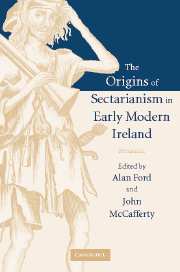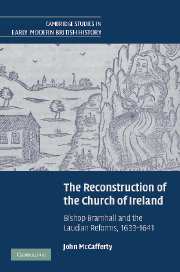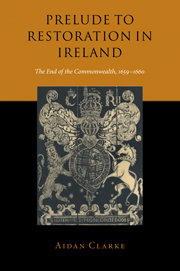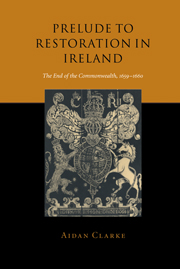The Origins of Sectarianism in Early Modern Ireland
Ireland is riven by sectarian hatred. This simple assumption provides a powerful explanation for the bitterness and violence which has so dominated Irish history. Most notably, the troubles in Northern Ireland have provided fertile ground for scholars from all disciplines to argue about and explore ways in which religious division fueled the descent into hostility and disorder. In much of this literature, however, sectarianism is seen as, somehow, a 'given' in Irish history, an inevitable product of the clash of the Reformation and Counter-Reformation, something which sprang fully formed into existence in the sixteenth century. In this book leading historians provide a detailed analysis of the ways in which rival confessions were developed in early modern Ireland, the extent to which the Irish people were indeed divided into two religious camps by the mid-seventeenth century, and also their surprising ability to transcend such stark divisions.
- Leading historians examine a formative period in Irish history
- An accessible, academic introduction to issues of sectarianism, religious division, and hatred which still remain of crucial importance in Northern Ireland today
- Brings together important new research on early modern Ireland
Reviews & endorsements
"This is a remarkably ambitious anthology on a question of enduring significance, one which examines 'the extent to which the Irish people were indeed divided into two religious camps by the mid-seventeenth century, and also their surprising ability to transcend such stark decisions.' But the essays benefit more from original research into the archives than from a relfective remodeling of religious paradigms, such as the debate over whether the therm should be 'confessionalization' or 'sectarianism'."
Sixteenth Century Journal, Jon Crawford, Roanoke College
"...the collection's emphasis on the complex and contingent nature of emerging communal identities is welcome indeed. In sum, this is a very strong collection of essays, and a must read for anyone interested in early modern British and Irish history."
Sean Farrell, Northern Illinois University
"...this collection of essays makes a most useful contribution to what has long been an 'under-researched' topic (pp. 237-239). Decades of conflict both stifled and polarized such debate. It is to be hoped that, in today's more open Irish political climate, this book will give rise to further publications on the subsequent development of sectarianism and confessionalization."
H-Catholic, Benjamin Hazard, Department of History, National University of Ireland, Maynooth
Product details
January 2006Hardback
9780521837552
260 pages
229 × 152 × 19 mm
0.55kg
Available
Table of Contents
- 1. Living together, living apart: sectarianism in early modern Ireland Alan Ford
- 2. Confessionalization in Ireland: periodisation and character, 1534–1649 Ute Lotz-Heumann
- 3. Protestant prelates or godly pastors? The dilemma of the early Stuart episcopate John McCafferty
- 4. 'In imitation of that holy patron of prelates the blessed St Charles': Episcopal activity in Ireland and the formation of a confessional identity, 1618–53 Tadhg Ó Hannracháin
- 5. A haven of popery: English Catholic migration to Ireland in the age of plantations David Edwards
- 6. The Irish historical renaissance and the shaping of Protestant history Alan Ford
- 7. Religion, culture and the bardic elite in early modern Ireland Marc Caball
- 8. The political and religious thought of Florence Conry and Hugh McCaughwell Mícheál MacCraith
- 9. Sectarianism: division and dissent in Irish Catholicism Brian Jackson
- 10. Concluding reflection: confronting violence of the Irish reformations John Morrill.








